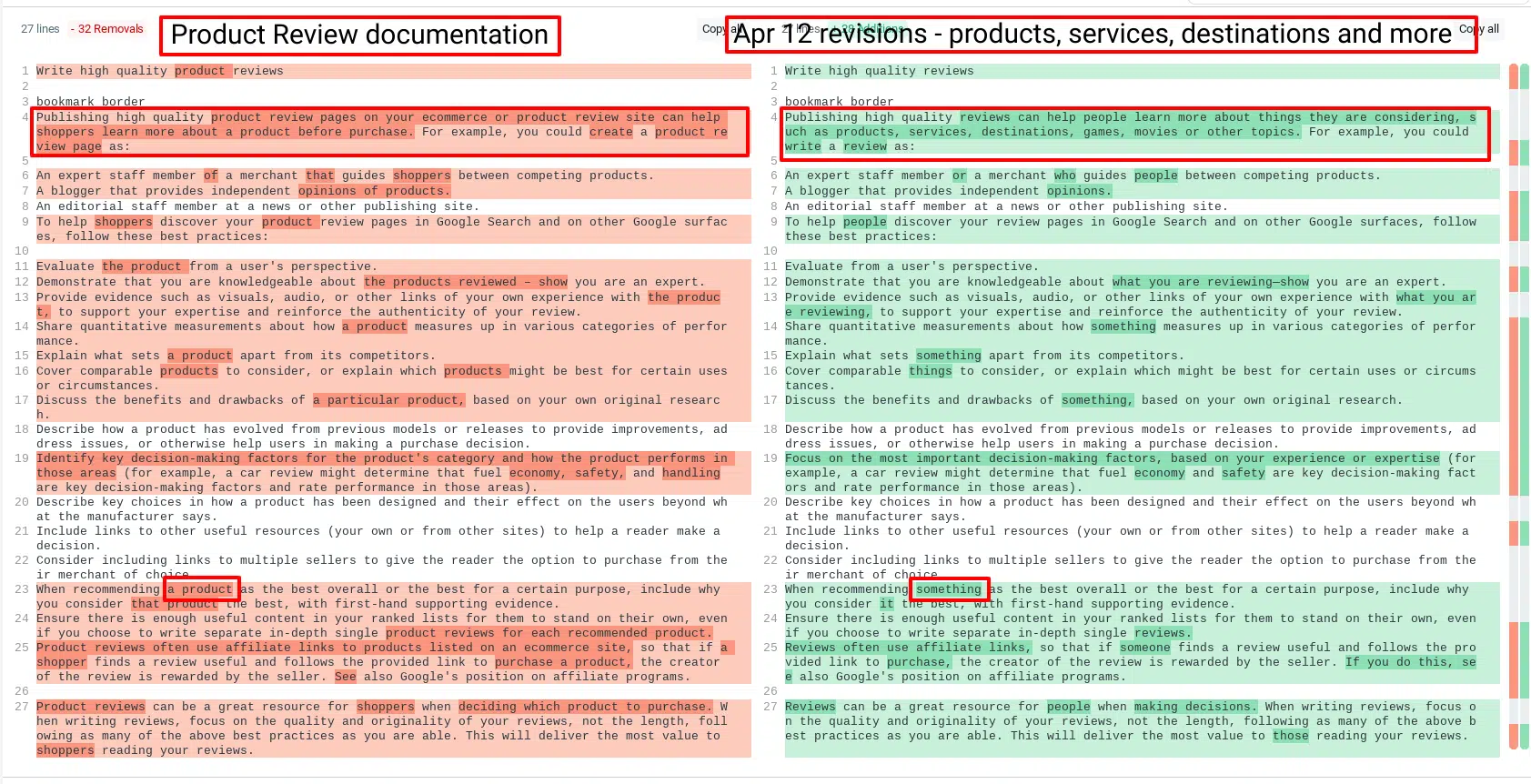Google is no longer just looking at product reviews. Google’s review system is now evaluating reviews about services, media and other topics.
- Services and businesses.
- Destinations.
- Media (e.g., games, movies).
The big takeaway. Google has changed the name of its “product reviews system” to “reviews system” and has altered the language in multiple parts of its guidance documentation around product reviews to now apply to all types of reviews.
Announcement. Google announced the April 2023 reviews update on Twitter:
Google also updated its Search Status dashboard at 9:08 PDT with the following: “Released the April 2023 reviews update, which now covers reviews about products, services, and things. Learn more about how to write high quality reviews.”
Google makes “product review” guidance “review” guidance. This is a big change. Google has reworded its article on How to write high-quality reviews in multiple places, providing guidance about “product reviews” to simply apply to all types of “reviews” – just with more generic language.
You can see many of the changes here, as shared by Marie Haynes on Twitter:

For example, Google has edited “shoppers” to become “people.” And a “product” becomes a “thing” or “something” or is simply deleted.
While the edits are small in terms of grammatical choices, they are big in terms of implications and scope. What was the product reviews update now essentially applies to every possible type of review as part of Google’s review system.
Review system name change. The “Google Search’s reviews system and your website” page, before this update, was called “Google Search’s product reviews system and your website.” That page is now 301 redirecting to the new page.
Google added some new guidance:
The reviews system is designed to evaluate articles, blog posts, pages or similar first-party standalone content written with the purpose of providing a recommendation, giving an opinion, or providing analysis. It does not evaluate third-party reviews, such as those posted by users in the reviews section of a product or services page.
Reviews can be about a single thing, or head-to-head comparisons, or ranked-lists of recommendations. Reviews can be about any topic. There can be reviews of products such as laptops or winter jackets, pieces of media such as movies or video games, or services and businesses such as restaurants or fashion brands.
Most of the other changes were simply deleting the word “product,” except where it added “services or other things” to the first line in the “How the reviews system works”:
“The reviews system works to ensure that people see reviews that share in-depth research, rather than thin content that simply summarizes a bunch of products, services or other things.”
– Google Search’s reviews system and your website
Why we care. If your website publishes any type of review content, this will be an important update to watch. Check your rankings to see whether your organic traffic improves, declines or stays the same.
Google on high-quality reviews. So what does Google consider a high-quality review? Google has shared 14 best practices (note that these are not new):
- Evaluate from a user’s perspective.
- Demonstrate that you are knowledgeable about what you are reviewing—show you are an expert.
- Provide evidence such as visuals, audio, or other links of your own experience with what you are reviewing, to support your expertise and reinforce the authenticity of your review.
- Share quantitative measurements about how something measures up in various categories of performance.
- Explain what sets something apart from its competitors.
- Cover comparable things to consider, or explain which might be best for certain uses or circumstances.
- Discuss the benefits and drawbacks of something, based on your own original research.
- Describe how a product has evolved from previous models or releases to provide improvements, address issues, or otherwise help users in making a purchase decision.
- Focus on the most important decision-making factors, based on your experience or expertise (for example, a car review might determine that fuel economy and safety are key decision-making factors and rate performance in those areas).
- Describe key choices in how a product has been designed and their effect on the users beyond what the manufacturer says.
- Include links to other useful resources (your own or from other sites) to help a reader make a decision.
- Consider including links to multiple sellers to give the reader the option to purchase from their merchant of choice.
- When recommending something as the best overall or the best for a certain purpose, include why you consider it the best, with first-hand supporting evidence.
- Ensure there is enough useful content in your ranked lists for them to stand on their own, even if you choose to write separate in-depth single reviews.
Languages impacted. Google said this system applies to these languages: English, Spanish, German, French, Italian, Vietnamese, Indonesian, Russian, Dutch, Portuguese and Polish.
Previous product review updates. This is an evolution of Google’s series of product review updates – of which there have been six since 2021. Google has now redirected all of its prior pages providing guidance around the “product reviews” update to its revised “reviews” guidance.

